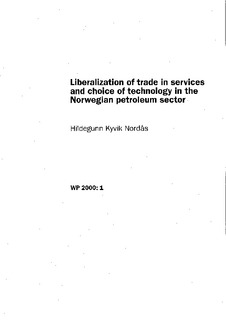Liberalization of trade in services and choice of technology in the Norwegian petroleum sector
Working paper
Permanent lenke
http://hdl.handle.net/11250/2435927Utgivelsesdato
2000Metadata
Vis full innførselSamlinger
- Bora-import [434]
Sammendrag
The petroleum sector is a service-intensive industry. The quality, price and availability of services are therefore important for the productivity level in the petroleum sector. This paper analyzes how intermediate inputs contribute to productivity in the Norwegian petroleum sector and discusses how technical progress and changes in the international trade regime affect productivity and vertical relations between oil companies and their suppliers. It is shown that in a small market, tailor-made inputs and dose vertical relations between the oil companies and their suppliers are the preferred and most cost-effective technology. As the market expands, the relative cost of tailor-made inputs increases, and at one critical point becomes less cost-effective than standardized inputs. A policy implication of the analysis is that the NORSOK policy of enhancing standardization needs to be complemented with a more open market in order to achieve its objectives. The analysis is particularly relevant for oil-related producer services, since this is the market for intermediate inputs that is the least open.
Utgiver
Chr. Michelsen InstituteSerie
CMI Working paperWP 2000: 1
